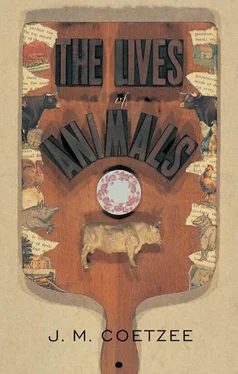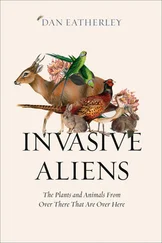The possibility of voluntary, mutual surrender to the dictates of intersubjectivity constitutes the common ground that Aquinas and O’Hearne ignore when they claim that animals and humans cannot be friends. I use the word “surrender” intentionally, for relating to others (human or nonhuman) in this way requires giving up control over them and how they relate to us. We fear such loss of control, but the gifts we receive in turn make it a small price to pay.
Thus because I regard Safi as a person, and she regards me as one, we can be friends. As in any genuine human-to-human friendship, our relationship is predicated on mutual respect and reciprocity. Although she depends on me to provide certain necessities, like food and water, this dependence is contingent, not inherent; if I lived in the world of wild dogs, I would depend on her for food and protection and much more. She is not my child; she is not my servant. She is not even my companion, in the sense of existing to keep me company. I wish for her what I wish for all of my friends: maximum freedom of expression, maximum well-being.
So that Safi and I can experience the full joys of canine-being and primate-being, we spend a lot of time outside, moving freely. Most of the dog-walkers I know automatically decide where to go, and the dog accommodates. But because I spent years following baboons around, I realized that nonhumans tend to have a superior grasp of wild places. It was natural to transfer this attribution to Safi, and I made sure that she understood the words “You decide where to go,” as well as “Please bring us back to the car [or house or camp].” Thus much of the time we are outside together, Safi, not I, determines where we go. Putting Safi in charge turned out to be a very good idea, because she reliably discovers more interesting places to go than I ever would: the beaver dam hidden behind the boulders, the secret stream at the bottom of the valley, found just as we are yearning for a drink.
Because Safi has considerable autonomy, she freely chooses many aspects of how she will relate to me. As a result, she does things for me that I could never have imagined and certainly could never have “trained” her to do. For example, at some point Safi apparently decided that when we’re alone in the wilderness, whenever I close my eyes or lie down, her job is to remain sitting or standing, monitoring all directions continually. I discovered, in fact, that she will refuse to lie down or close her eyes, no matter how tired she is, unless I adopt an alert posture and tell her, expressly, that it is OK for her to rest (one of the many sentences she understands). Had I “trained” her to play this role, I would have to rely on her continued “obedience” to rest assured that I was fully protected. But because Safi chose this role of her own accord, presumably out of a deep regard for my safety, I trust her absolutely to continue to watch over me.
In our early months together, Safi appeared to prefer perfunctory pats to wrestling or snuggling, and she still does not relish the kinds of extensive physical contact that most dogs crave from the people they love. This aversion to cuddling makes all the more precious her behavior when I am feeling very low. First she approaches, looks into my eyes, and presses her forehead against mine. Then, without fail, she lies down beside me, maximizing contact between her body and mine. At this point, if I’m not already lying down, I do so (Safi has taught me that). As soon as I am supine, she rests her chin on my chest, right on top of my heart, and locks her gaze with mine until my mood shifts. Perhaps, a skeptic might respond, she does this simply because she’s learned, first, that you’re more fun when you’re not feeling sad, and, second, that she can cheer you up in this way. To this I would reply: if we had human companions who behaved in much the same way, for identical motives, would we doubt their sincerity, or consider ourselves very lucky indeed?
I do not claim that any dog will show such behaviors if treated as an equal. In fact, I believe that Safi is exceptional, that she was born, perhaps, with an unusually sensitive nature. However, I do firmly believe—and my experience with other animals supports this belief—that treating members of other species as persons, as beings with potential far beyond our normal expectations, will bring out the best in them, and that each animal’s best includes unforeseeable gifts.
What would Elizabeth Costello say to all this? I suspect she would not be surprised by my experiences with baboons or my relationship with Safi. Indeed, they seem very much in keeping with her claim that “there is no limit to the extent to which we can think ourselves into the being of another.” But I would phrase her point slightly differently, so that it has less to do with the poetic imagination and more to do with real-life encounters with other animals. My own life has convinced me that the limitations most of us encounter in our relations with other animals reflect not their shortcomings, as we so often assume, but our own narrow views about who they are and the kinds of relationships we can have with them. And so I conclude by urging anyone with an interest in animal rights to open your heart to the animals around you and find out for yourself what it’s like to befriend a nonhuman person.
J.M. COETZEE is the author of seven novels (most recently The Master of Petersburg , 1994) and three volumes of criticism, as well as of memoirs and translations. Among the prizes he has won for his fiction are the Booker Prize, the Prix Femina, and the Jerusalem Prize. He is Professor of General Literature at the University of Cape Town.
WENDY DONIGER is the Mircea Eliade Distinguished Service Professor of the History of Religions at the University of Chicago. Her most recent book is The Implied Spider: Politics and Theology in Myth ; forthcoming is Splitting the Difference: Gender and Myth in Ancient Greece and India . She graduated from Radcliffe College and received a Ph.D. from Harvard University and a D.Phil. from Oxford.
MARJORIE GARBER is William R. Kenan, Jr., Professor of English at Harvard University, and Director of Harvard’s Center for Literary and Cultural Studies. A Shakespearean and a cultural critic, she is the author of seven books, including, most recently, Dog Love and Symptoms of Culture .
AMY GUTMANN, Laurance S. Rockefeller University Professor at Princeton University, is founding director of the University Center for Human Values. Her books include Democratic Education (Princeton University Press), Democracy and Disagreement , with Dennis Thompson (Harvard University Press), and Color Conscious , with Anthony Appiah (Princeton).
PETER SINGER is a Professor in the Centre for Human Bioethics at Monash University. He is the author of several books, including Animal Liberation , Practical Ethics , The Expanding Circle , and Rethinking Life and Death . From July 1999, he will take up an appointment as DeCamp Professor of Bioethics in the University Center for Human Values at Princeton University.
BARBARA SMUTS is Professor of Psychology and Anthropology at the University of Michigan. She is the editor of Primate Societies and author of Sex and Friendship in Baboons as well as numerous scientific articles on social relationships in wild primates and dolphins. She received a B.A. in Anthropology from Harvard College and a Ph.D. in Neuro- and Bio-behavioral Sciences from Stanford University Medical School.
©1999 by Princeton University Press
Published by Princeton University Press, 41 William Street, Princeton, New Jersey 08540
Читать дальше












